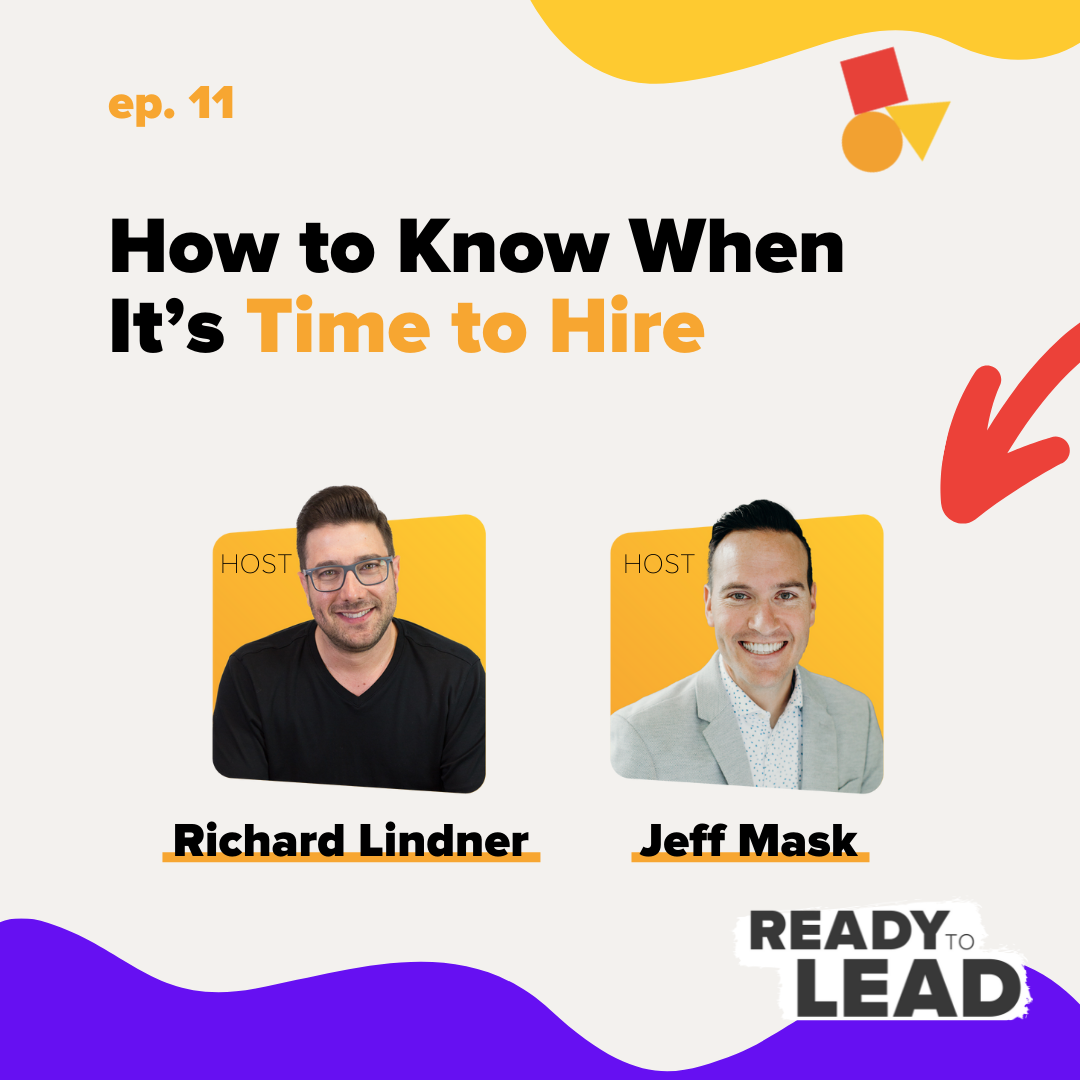Hiring a new person is serious business, and there are some really important questions to ask yourself as a leader before you take that step.
In this episode, hosts Richard Lindner and Jeff Mask walk through some really vital steps we need to take before we bring someone else on our team. In Richard’s company, they have a saying that reflects an important value:
We take the social responsibility of hiring very seriously.
What does that mean? It means that, when they make the decision to hire someone, it’s more than an exchange of time for money. It’s not a pair of jeans at Nordstrom’s. It’s a human. They have other humans relying on them. And hiring should only be done after much care and consideration.
Listen in for some great advice on making these key hiring decisions as a leader.
Taking the Social Responsibility of Hiring Very Seriously
When Richard’s company is considering hiring someone new, they do what they call “work journaling” for a bit first. They ask questions like: What are we doing? How are we spending our time? Is the leader hoarding something that should be passed down? What percentage of my day is spent on things I should be doing? What percentage of my day is spent on things I should be delegating?
And they follow these three basic rules of thumb:
- We don’t throw people at inefficiencies
- We don’t throw people at “we’ve always done it that way”
- We don’t throw people at seasonality
Each of these things leads to unnecessary hires. That’s bad for the leader, the company, and the person you hired. Why don’t they throw people at these things? Because they take the social responsibility of hiring very seriously. When we’re in the most pain we’re most likely to throw a warm body at a problem. Don’t hire people in your emotional state. Step back and assess first.
You Can Never Make Enough Lists
If someone requests additional help doing their job, make some lists. What the leader is doing, what everyone on the team is doing, what the person requesting additional help is doing. Go back to that critical task list—Do, Defer, Delegate, Delete. For the person asking for another hire, ask: Do you have the time to do all of this? Are we following a documented process? Is it efficient? What can we automate?
When you ask those questions (about how you’re spending your time, etc.), you can figure out if you actually need to hire someone, or if you just need to make some other changes. What if you get really efficient with your time two weeks after you hire a new person? Don’t hire for seasonal work unless you’re advertising for a short-term, temporary, seasonal hire. If people don’t know they’re being hired temporarily, don’t hire them temporarily.
These are the processes you have to go through so you can be socially responsible when you hire. We as leaders can get frustrated and impatient. Once again, all problems are leadership problems. We have to take this responsibility very seriously.
Check Yourself Before You Wreck Yourself
There are a few things Richard and Jeff encourage you to be aware of and think about as you’re considering hiring.
There are people who are empire builders who like to build a large team of people underneath them. You need to look in the mirror to know yourself. Are you an empire builder? Does success for you look like the number of employees you have? Do you have a ton of employees but your company isn’t profitable?
Vanity metrics are things that look and feel great but ultimately don’t drive to the end result we’re looking for. A million subscribers but no engagement. A huge email list but not a good open rate. A boatload of employees but not comparable profitability.
Richard says he won’t bring on a person unnecessarily, because the profitability of his company will go down, and he’s endangering his whole team.The goal of the company is profitability, making money. You need to know what profitability looks like and whether or not a new hire will bring you more of that.
Jeff says to run through the 3 Ps (people, profit, purpose). Who are the people who can generate the profit to ultimately fulfill the purpose? You need all 3 legs of the stool. The right people, the right profit, your right purpose. It’s a sustainable model.
Necessity drives invention and innovation, but we need self-discipline to be as efficient as possible, to be wise stewards of what we’ve been given. Do the work beforehand. Make sure you actually need another team member before you add them.
If someone on your team asks you to hire someone, Richard says you can say, “Great, let’s talk about it. At this company, we take the social responsibility of hiring people very seriously. We have a process to walk through first. First thing, brain dump, work journal. Then categorize all your tasks (4 Ds). Make sure we have processes and automation in place. If we go through all this and still think we need the person, great. Let’s do it!
The next episode is a micro-episode about Who to Hire. Stay tuned!
Richard and Jeff want to hear from YOU. What questions do you have about hiring? Do you have any positive tips or stories about hiring to share? What other topics would you like them to address on the show? Email them here with your thoughts/questions: feedback@readytolead.com
OTHER SHOWS YOU MIGHT ENJOY:
- Business Lunch with Roland Frasier and Ryan Deiss
- Perpetual Traffic with Ralph Burns and Kasim Aslam
- DigitalMarketer Podcast


